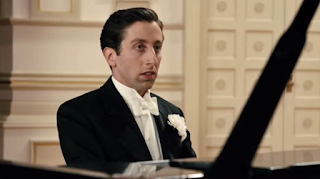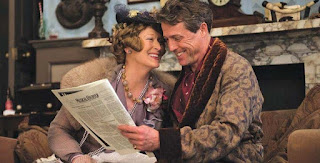Now and then over the past 40 years or so I would hear of the legendary Florence Foster Jenkins, the self-proclaimed coloratura soprano who lived from 1868-1944. Each time during the discussion, I always said that Hollywood should make a movie of her eccentric life. Now it has finally happened, and the world is better for it. Florence only made a handful of private recordings, four of which can be accessed on YouTube. But before you go there, realize she was then, in the early part of of the 20th Century, and is now considered the worst singer, opera or otherwise, of all time. And Meryl Streep, who is padded to look frumpy, portrays her—wonderfully—in the succinctly named film, Florence Foster Jenkins.
As written by Nicholas Martin and directed by Stephen Frears (Philomena, The Queen), Florence Foster Jenkins is biographical, but not all-encompassing, since it centers only on the last year of her life in 1944. By this stage in Jenkins’ life, the wealthy New York heiress felt empowered to share her life long love of opera with the world. For years she headlined her own per se music club, and dabbled in singing for club members who seemed appreciative of her musical “gift.” The fact that Jenkins was rich and a socialite no doubt influenced their tin-eared adoration. However, Florence herself was truly tone deaf, and never heard herself except as the most skilled singer of opera.
___________________
ABOVE: The real and imagined (Meryl Streep) Florence Foster Jenkins.
___________________
As viewers and listeners of this film, we DO hear her voice, which Meryl Streep emulates perfectly….that is, with perfectly awful pitch. Florence had true fingernails-on-chalkboard voice talent.
Yet, as depicted in this movie, Florence is surrounded by enablers who tell her otherwise. There is her younger husband St. Clair Bayfield, impressively played by Hugh Grant—his best role in years. Add her club members, who seem to thrive on her every musical note. Then there is the legendary conductor, Arturo Toscanini (John Kavanagh), and a suffering vocal instructor, whose loyalty and perseverance is encouraged by the extravagant fees for her lessons.
 Then a young piano accompanist is hired, Cosmé McMoon (The Big Bang Theory’s Simon Helberg), who at first laughs out loud at Florence’s grating voice. He is set straight, however, by Florence’s husband, St. Clair. So at risk of losing his new job, Cosmé suppresses his giggles. Thus, this sweet, kind, narcissistic lady continues to live her illusion.
Then a young piano accompanist is hired, Cosmé McMoon (The Big Bang Theory’s Simon Helberg), who at first laughs out loud at Florence’s grating voice. He is set straight, however, by Florence’s husband, St. Clair. So at risk of losing his new job, Cosmé suppresses his giggles. Thus, this sweet, kind, narcissistic lady continues to live her illusion.Half-way through Florence Foster Jenkins, the laughs end for us as well since her obsession to become a major singing star has downturns. Her vision of grandeur has propelled her into a self-financed booking at no less than Carnegie Hall. The concert, which is recreated, results in a gamut of emotions both in the audience and on stage.
 Threading throughout the story is the unique (to say the least) relationship between Florence and St. Clair. While they are happily (common law) married and devoted to each other, he maintains a sexual relationship with his mistress, Kathleen Weatherly (Rebecca Ferguson). He usually kisses his wife good night, and then totters off across town to his apartment to sleep with Kathleen. It is implied that Florence’s long time medical condition (syphilis) inhibits a similar relationship with her husband.
Threading throughout the story is the unique (to say the least) relationship between Florence and St. Clair. While they are happily (common law) married and devoted to each other, he maintains a sexual relationship with his mistress, Kathleen Weatherly (Rebecca Ferguson). He usually kisses his wife good night, and then totters off across town to his apartment to sleep with Kathleen. It is implied that Florence’s long time medical condition (syphilis) inhibits a similar relationship with her husband. Do you now understand why I always thought Florence’s story could make a great movie? Well, we have it here. Florence Foster Jenkins is undoubtedly the best movie of 2016 so far, and seems out of place in—as usual—a summer of comic book superheroes. Streep, Grant and Helberg are Oscar worthy. So are the direction and writing, as well as Alexandre Desplat’s score.
——————————
GRADE on an A-F Scale: A





